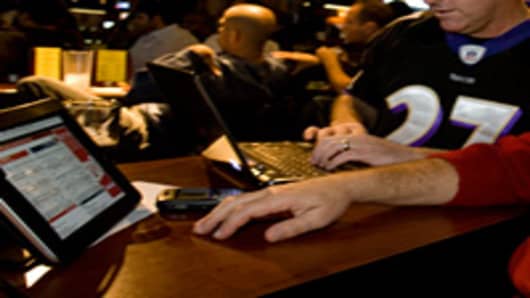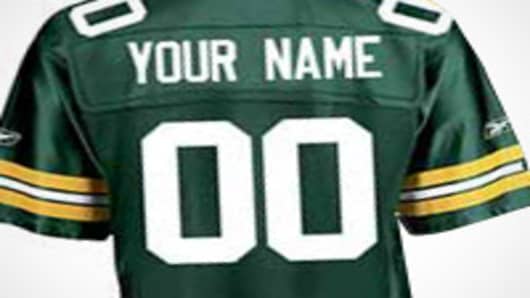The National Football League was not specifically targeting Bryan and Gary Fishkin, teenage brothers from South Orange, N.J., when it launched its free fantasy football competitiontwo years ago on the league’s website.
Bryan, 17, and Gary, 14, students at Columbia High School, don’t even play fantasy football on NFL.com. Both had fantasy teams — Vandalay Industries for Bryan, Whatchu Talkin’ Bout Hillis for Gary — on ESPN.com, one of the three other top fantasy football sites. But the NFL is thrilled to see teenagers like the Fishkins playing any fantasy game, be it on NFL.com, ESPN.com, CBSsports.com or Yahoo.com, in part of because of what the league refers to as a “halo effect.”
Young fantasy football players tend to ask their parents for official NFL merchandise, often of the real-life players, who are on their fantasy teams.
Fantasy football was created in 1962 but has mushroomed in popularity in the last decade, mostly because the Internet makes it easier to track the statistics compiled by the players in actual NFL games. A fantasy football player "owns" a team of real NFL players and plays games against owners of other teams, with points awarded based on the real NFL players' performances, including yards gained and points scored.
Fantasy team owners activate players from rosters that include quarterbacks, running backs, tight ends, wide receivers and one of the 32 NFL teams' defenses. They can add and subtract players through trades with other owners, releasing players or signing them as free agents. Some fantasy players simply draft players from their favorite NFL teams, but the competition — sweetened by pools of money in the thousands of dollars for adults — can become intense.
Bryan, a four-year fantasy veteran, received a jersey of Carolina quarterback Cam Newton over the holidays; Gary, a fantasy rookie this year, got a jersey of Jacksonville running back Maurice Jones-Drew. Asked if he would have wanted that jersey had he not been playing fantasy football, Gary said: “Definitely not.”
Bryan said he wanted a Newton jersey, “Because A, he was one of my main fantasy players, and, B, because of his fantasy impact. Two years ago, I asked for and got an Aaron Rodgers jersey, also because he was my fantasy stud,” he said, referring to the Green Bay Packers’ quarterback.
This sort of proclamation delights NFL executives like Cory Mummery, who directs the fantasy football site on NFL.com.
NFL replica jerseys cost $99.99 a pop, bringing in lots of cash for the league. Total sales of NFL licensed merchandise were $2.1 billion for the fiscal year ending Feb. 1, 2011.
The NFL is using fantasy football not merely to generate more revenue, but also to entice a new generation of fans to telecasts and league-related internet content.
“Users are often fans of one team, and maybe they are more casual, but as soon as they start playing fantasy football, we find they become more attached to the league as a whole,” Mummery told CNBC in a telephone interview from his office in Los Angeles.
NFL.com, like the other major sites, compiles statistics in real time of fantasy games, often flashed within seconds of the time a real player manages as little as a one-yard gain. NFL.com also stepped up its efforts this year to supply exclusive — and virtually instant — video highlights.
The league does not say precisely how many users participated in the fantasy leagues on NFL.com, but it did report a 50 percent increase in players in 2011 over 2010.
The idea is to keep fantasy players coming back to look at other pages on the site with fantasy blogs, polls, forums and analyses. According to statistics compiled by the league, fantasy users make 28 page views per visit, four times more than non-fantasy users, return twice as often, and stay six times longer.
Users between ages 13 and 29 account for 54 percent of registered fantasy players on NFL.com. The site does not charge a fee to register, which makes it appealing to youngsters, but it generates revenue with lots of advertising on the site. The site also lends helping hands to fantasy novices with a customer service help desk.
Most fantasy seasons last from Week 1 to Week 14 of the 17-week NFL regular season, with the 15th and 16th weeks designated for two rounds of “playoffs.” (The final week of the season is not used because many of the best teams rest players for the real NFL playoffs.)
*Super Bowl XLVI: Complete Coverage*
“There is also a newer breed of fantasy website out there that is growing in popularity,” said Justin Sablich, who blogs about fantasy football for The New York Times website. “Websites like Fanduel.combasically make gambling on football legal.”
Sablich said: “On FanDuel, users play in weekly games, picking a new team each week and competing with others in groups for instant cash. Since fantasy football is considered a game of skill, these websites are perfectly legal, but it certainly has the look and feel of a gambling website, certainly more than the standard games on ESPN.com or NFL.com. The bigger websites like ESPN.com and NFL.com have stayed away from these kinds of formats, but as the weekly game format grows in popularity, you could see them going down that road.”
In the meantime, NFL.com has added a heavily marketed program it calls “The Fantasy Playoff Challenge,” in which users receive points based on performances of real players and teams in the playoffs.
Mummery said 60 percent of regular-season fantasy players are participating in the challenge, which offers free trips to the Super Bowl next year. Also, NFL.com is offering a competition in which visitors can predict the results of the NFL Draft in April.
“We put a lot of effort into keeping our users,” he said.
The NFL partners with ESPN, CBSand Yahoo! so the league does not mind that fantasy players use the three other major NFL fantasy football sites. People are showing an interest in the NFL, which means they might be more likely to buy a Marshawn Lynch “Beast Mode” T-shirt, like Gary Fishkin’s parents did for him.
“We just want the fantasy industry, as a whole, to grow as big as possible,” Mummery said. “We want to grow the game as much as possible.”



